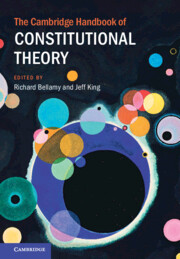Book contents
- The Cambridge Handbook of Constitutional Theory
- The Cambridge Handbook of Constitutional Theory
- Copyright page
- Contents
- Figures
- Contributors
- Frontispiece
- Preface and Acknowledgements
- 1 Introduction
- Part I Values
- Part II Modalities
- Part III Institutions
- Part IV Challenges for Constitutional Democracy
- 56 Inequality
- 57 Populism
- 58 Climate Change
- 59 Migration
- 60 Constitutional Hardball
- Bibliography
- Index
- References
56 - Inequality
from Part IV - Challenges for Constitutional Democracy
Published online by Cambridge University Press: 27 March 2025
- The Cambridge Handbook of Constitutional Theory
- The Cambridge Handbook of Constitutional Theory
- Copyright page
- Contents
- Figures
- Contributors
- Frontispiece
- Preface and Acknowledgements
- 1 Introduction
- Part I Values
- Part II Modalities
- Part III Institutions
- Part IV Challenges for Constitutional Democracy
- 56 Inequality
- 57 Populism
- 58 Climate Change
- 59 Migration
- 60 Constitutional Hardball
- Bibliography
- Index
- References
Summary
Constitutions are, above all, a compact among equals: they represent a contract that aims to include everyone, on an equal footing. This fact is explicitly reflected in a majority of constitutions, which appear openly committed to a principle of legal equality. The problem is that, from its very origins, this egalitarian constitutional ideal encountered enormous difficulties that prevented it from becoming ae reality in practice. Almost every area covered by the equality principle - whether we refer to the rights of racial, sexual or ethnic minorities, or to the workers’ rights – was transformed into a space for legal and political dispute. This chapter explores a few of those “disputed territories”, including conflicts around social rights; gender inequality; and indigenous rights. In this way, this text pays attention to the continuous, unfinished battle between the constitutional ideal of equality and a political practice systematically oriented to defy it.
Keywords
Information
- Type
- Chapter
- Information
- The Cambridge Handbook of Constitutional Theory , pp. 997 - 1014Publisher: Cambridge University PressPrint publication year: 2025
